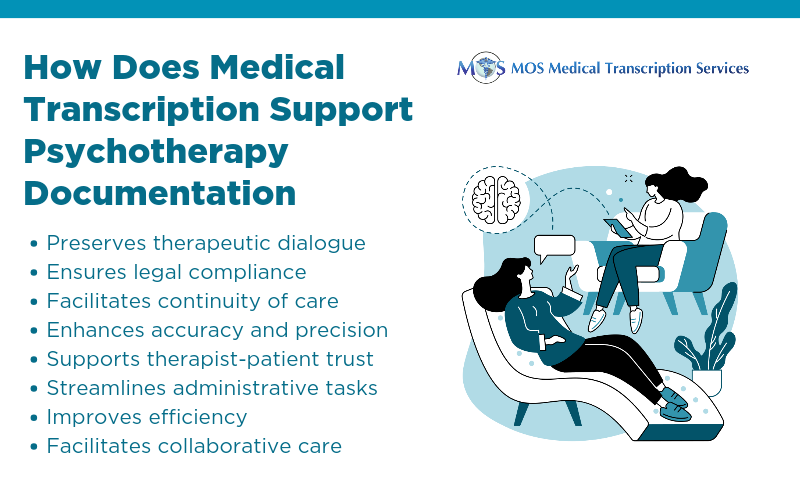
Table of Contents
For mental health services, effective documentation is not just a formality-it’s a crucial aspect of providing quality care and maintaining professional standards. Psychotherapy services, in particular, demand careful documentation to ensure optimal patient care, accurate billing, and legal compliance. This therapeutic approach addresses mental health challenges through verbal communication and psychological interventions. Most psychotherapy sessions involve a licensed mental health professional and a patient meeting one-on-one or with other patients in a group setting. HIPAA-compliant mental health transcription services are a critical component of ensuring accurate, ethical, and legally compliant psychotherapy documentation.
Psychotherapy Transcription – Core Documentation Requirements
The key documentation requirements for psychotherapy services are as follows:
- 1. Intake assessment:
- Comprehensive patient history – Conduct a thorough exploration of the patient’s medical and psychological history, including previous treatments and medications.
- Current mental health status – Assess the patient’s mental health status by evaluating symptoms, triggers, and coping mechanisms.
- Relevant personal and family information – Gather relevant details to understand the broader context, potential stressors, and familial influences on the patient’s mental health.
- 2. Treatment plans:
- Clearly defined goals and objectives – Collaboratively establish clear and realistic therapeutic goals, ensuring alignment with the patient’s expectations and aspirations.
- Specific interventions and therapeutic modalities – Specify detailed involvements and therapeutic modalities tailored to address the patient’s unique needs and challenges.
- Strategies for evaluating progress – Develop strategies for assessing development, incorporating measurable indicators to assess the effectiveness of the chosen therapeutic approaches.
- 3. Progress notes:
- Regular documentation of sessions -Maintain detailed documentation of each therapy session, recording the topics discussed, emotional states observed, and therapeutic techniques employed.
- Observations, insights, and patient responses -Capture valuable remarks and insights into the patient’s evolving mental health, facilitating a comprehensive understanding of their progress.
- Adjustments to the treatment plan -Note any adjustments made to the treatment plan based on the patient’s responses, ensuring a dynamic and responsive approach to their evolving needs.
- 4. Informed consent forms:
- Detailed information about the therapeutic process – Provide a comprehensive overview of the therapeutic process, ensuring the patient fully understands the nature, goals, and potential outcomes of the treatment.
- Risks, benefits, and alternatives to treatment – Clearly outline the associated risks, benefits, and available alternatives, fostering informed decision-making.
- Consent for release of information if necessary – Obtain consent for the release of information when necessary, maintaining transparency and adhering to ethical standards in information sharing.
- 5. Assessment tools and tests:
- Results of psychological assessments – Present the results of psychological assessments conducted, offering valuable insights into the patient’s cognitive, emotional, and behavioral functioning.
- Testing instruments used – Specify the testing instruments employed, highlighting their relevance to the diagnostic and therapeutic process.
- Interpretation of test scores – Provide a thorough interpretation of test scores, linking findings to treatment planning and reinforcing the collaborative nature of the therapeutic journey.
- 6. Billing information:
- Accurate details for insurance claims – Accurately document services provided for insurance claims, aligning with the recognized procedural and diagnostic codes.
- Timely submission to ensure reimbursement – Prioritize timely submission of claims, promoting financial sustainability and accessibility of mental health services for the patient.

Role of a Medical Transcription Company
A HIPAA-compliant medical transcription company plays a key role in ensuring accurate and comprehensive documentation of psychotherapy services. The sensitive and confidential nature of psychotherapy sessions demands a level of precision and professionalism that specialized transcription services can provide. These companies have skilled transcriptionists, familiar with mental health terminology and nuances, ensuring that the transcribed documents faithfully capture the intricacies of therapeutic dialogue.
Want more information on this? Read our blog on “The Essentials of Mental Health Documentation”
Reliable service providers are committed to maintaining the highest standards of confidentiality and adherence to industry regulations, safeguarding the privacy of patients and therapists alike. With their expertise, professional companies transcribe spoken words into written form and contribute significantly to the therapeutic process by providing therapists with a reliable and organized record of their sessions. This promotes continuity of care, legal compliance, and the overall effectiveness of psychotherapeutic interventions.


